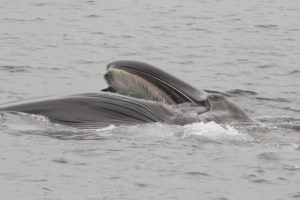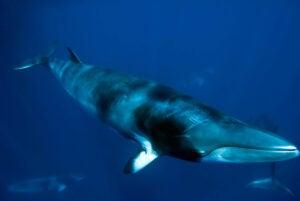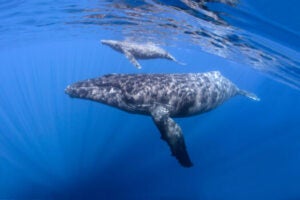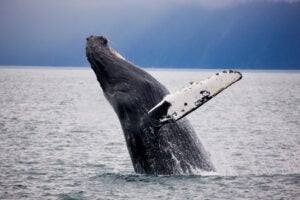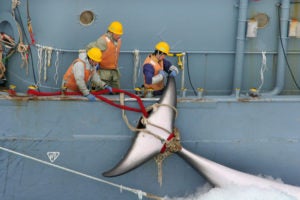
LIMA, Peru—Attempts to bring back commercial whaling both directly and under the guise of food security have both failed at the 69th International Whaling Commission meeting in Peru this week, to the relief of animal protection and conservation non-profits including Humane Society International.
The draft resolution on food security had been submitted by the Republic of Guinea and co-sponsored by Cambodia, Ivory Coast, Gambia, Ghana, Guinea-Bissau, Republic of Congo, Senegal and St. Kitts and Nevis, close allies of Japan which has sought to scrap the moratorium since it was first adopted in 1982. However, realising that they would have lost if put to a vote, the proponents withdraw it instead. They will work on it intersessionally before the next IWC meeting in Australia in 2026.
Dr Madison Miketa, wildlife scientist at Humane Society International, said: “While we are glad this proposal has been withdrawn, we don’t believe it should return in the future because the IWC is not the appropriate venue for addressing food security concerns. This proposal was never about food security; the nations that put forward this proposal have no history or cultural traditions of eating whale meat. In fact, 110 signatories from West and Central Africa (the region of the majority of proponents of this proposal) condemned the proposal and state that whale meat consumption doesn’t contribute to food security in their region. This proposal was about being a good ally to pro-whaling Japan which has continually attempted to erode the ban on commercial whaling.
“Whales are worth far more alive than dead and are critically important for healthy, productive oceans. For communities reliant on eco-tourism and whale watching income, or those dependent on healthy fish stocks, the presence of abundant whale populations is a lifeline. Furthermore, killing these long-lived, slow reproducing animals who are also impacted by myriad human-caused threats such as climate change, pollution and fisheries bycatch, would do nothing to ameliorate food insecurity. Not to mention that whale meat and blubber are often contaminated with high levels of pollutants and heavy metals such as mercury and PCBs, making them unsafe for human consumption.”
Since the ban on commercial whaling was implemented in 1986, the majority of nations that were previously engaged in commercial whaling have successfully transitioned to whale watching, which depends on healthy whale populations. Not only have they not suffered economic or nutritional distress as a result, but protecting whales, rather than killing them, delivers far better economic, social and environmental benefits to local communities.
Also withdrawn was a proposal aimed at undermining the more than 40-year-old ban on commercial whale killing. The draft resolution had been submitted by Antigua and Barbuda and co-sponsored by St. Lucia, close allies of Japan which has sought to scrap the moratorium since it was first adopted in 1982. These two countries supported Japan’s pro-whaling agenda when it was an IWC member, and although Japan withdrew from the IWC in 2019, it continues to project its pro-whaling influence via its allies.
Grettel Delgadillo, deputy director of Humane Society International/Latin America says: “We are relieved that the dark and dangerous resolution to resume commercial whaling was withdrawn and can no longer take up precious time here at IWC. Lead proponents Antigua & Barbuda with the support of St Lucia, chose withdrawal over inevitable defeat on the floor once they realised the majority of nations gathered would not support their attempts to dismantle the global moratorium. But for this twin-nation state to so persistently pursue a pro-whaling agenda despite having no dietary, cultural, economic or historical connection with whaling or whale meat, demonstrates how Japan continues to influence IWC despite no longer being a member. The global moratorium on whaling has spared the lives of hundreds of thousands of cetaceans and been instrumental in pulling many species back from the brink of extinction. Commercial whaling is unethical, unsustainable and unnecessary. Whales face myriad threats from commercial hunting, fisheries bycatch, noise and plastic pollution, ship strikes and the urgent climate crisis. They need the moratorium and the IWC now more than ever.”
HSI’s whale experts at the IWC meeting are available for interviews.
ENDS
Media contact: Wendy Higgins, Director of International Media, whiggins@hsi.org





